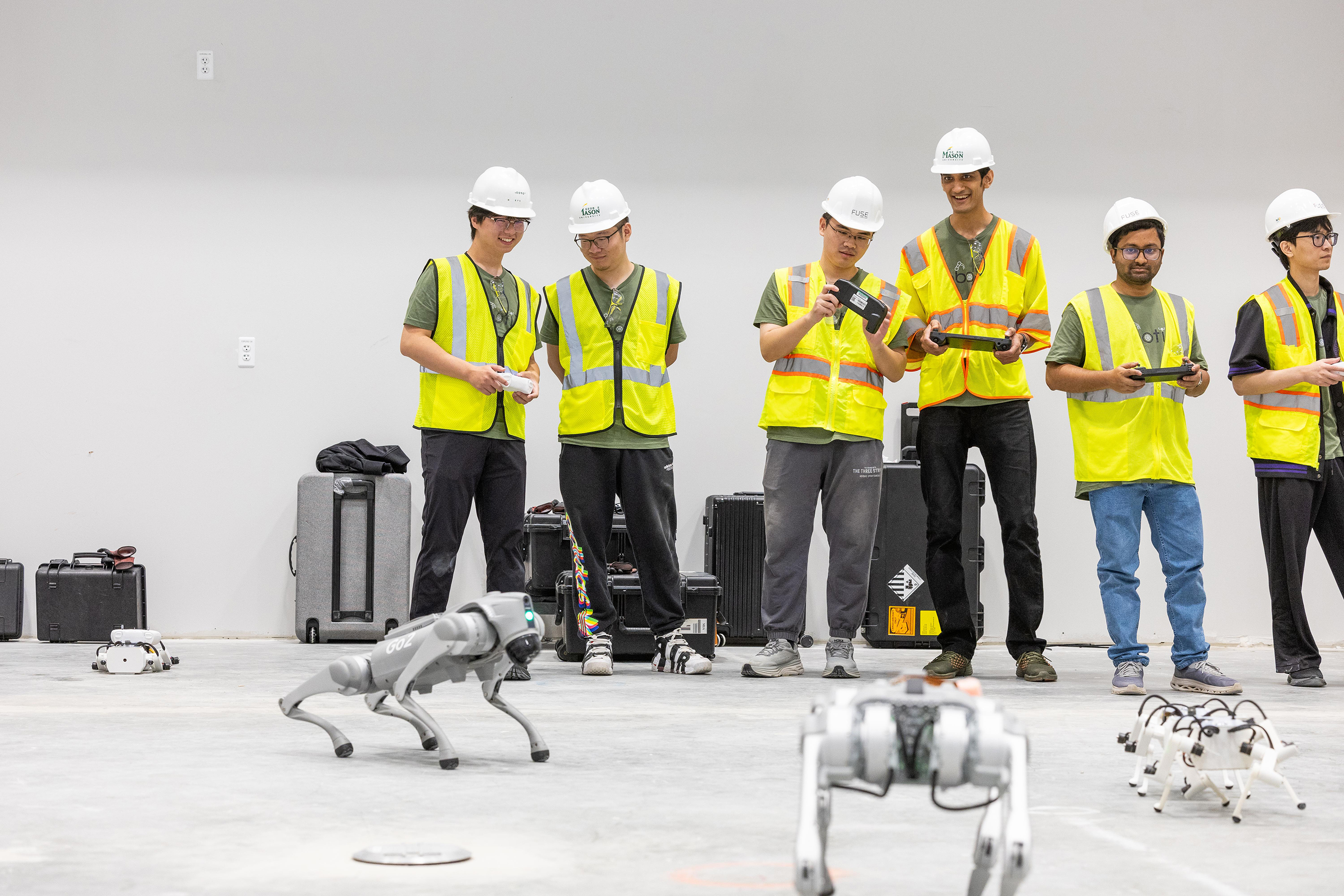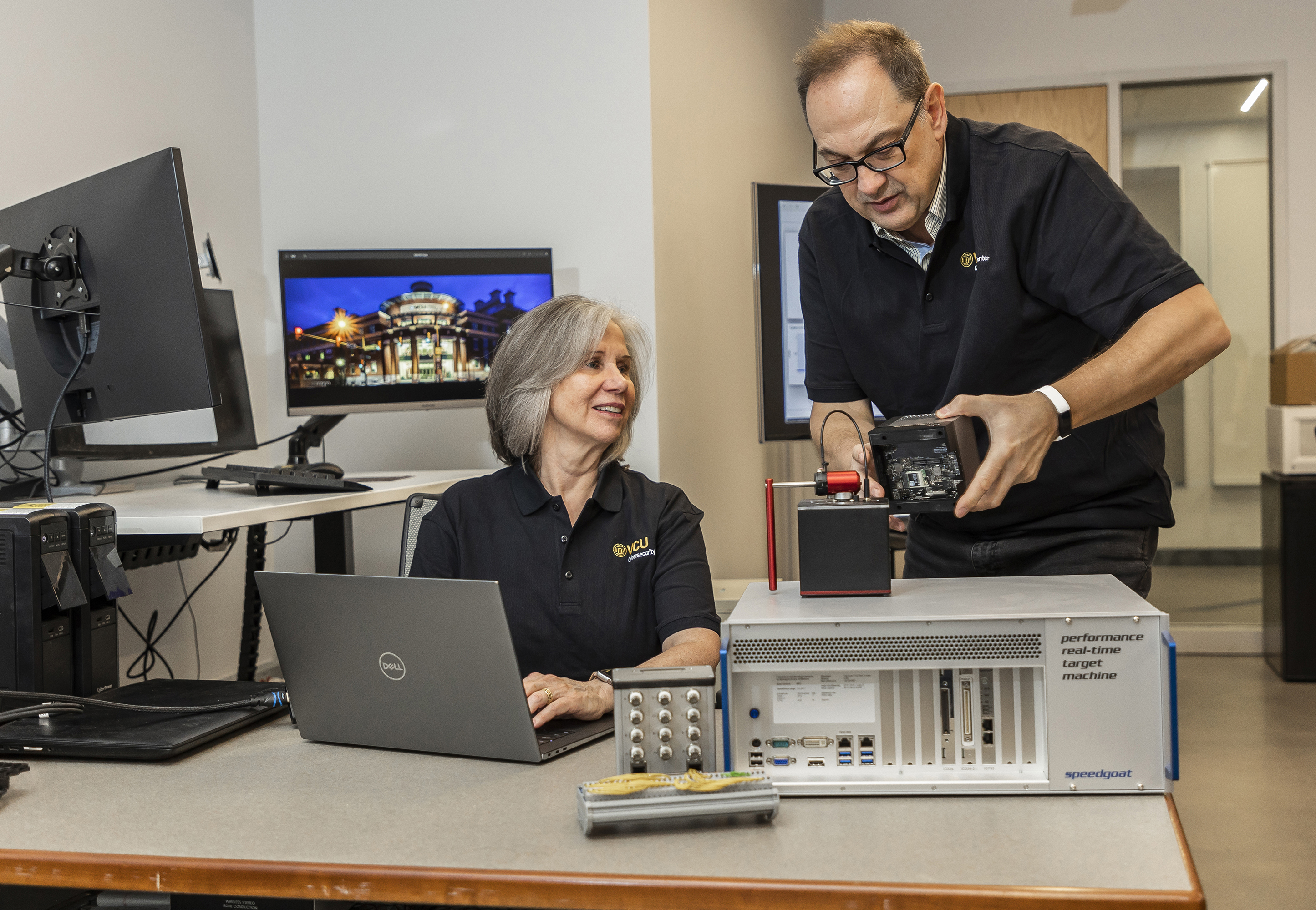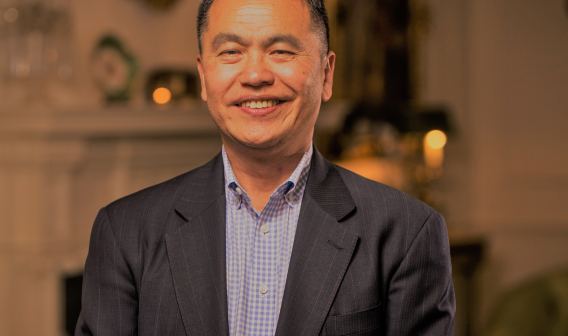Bolstering Cyber Defenses Through Collaboration
5 years after launching, Commonwealth Cyber Initiative continues to drive critical research

George Mason University’s Fuse at Mason Square opened for commercial use in 2024 and will open to students in fall 2025. The state-of-the-art building will house the university’s new School of Computing and host courses in AI and cybersecurity.
In an era where cyberattacks threaten everything from bank accounts to national security, the need for cybersecurity has never been higher. In 2020, data breaches, ransomware, and other cybercrimes cost the United States over $4 billion in damages, according to the Federal Bureau of Investigation. As cybercrime advances, damages could reach $10.5 trillion globally by the end of 2025, research firm Cybersecurity Ventures estimates — nearly 36% of America’s GDP, according to the Bureau of Economic Data.
In Virginia, the stakes are even higher. The Commonwealth is home to critical defense infrastructure, major technology companies, and one of the largest concentrations of data centers in the world. Attacks on these systems would not only lead to mass technological disruptions, but potentially destabilize the country.
Virginia’s Commonwealth Cyber Initiative (CCI) is devising innovative solutions to these emerging threats. Launched in 2020, CCI is a state-funded program that collaborates with businesses, higher education institutions, and local governments to support research, innovation, and workforce development in cybersecurity across the region. In 2024, CCI brought in $112 million in fresh grants and contracts, more than triple the amount it had raised since its inception. More than 45 higher education institutions in the Commonwealth, including community colleges and universities, participate in the initiative, and that network continues to grow.
By harnessing expertise across sectors, CCI has spearheaded leading work in areas like AI-driven threat detection and secure wireless communications through grants, key faculty hires, and regional collaboration. The initiative’s focus on advancing knowledge and technology aims to bolster companies’ ability to counter evolving cyber threats.
“One way we see impact is the success our faculty has in attracting teams, especially large-scale research projects, where you need some critical mass of capabilities to be able to compete,” said Luiz DaSilva, executive director of CCI. “We’ve seen enormous growth, especially in the last two years, where our early investments made five years ago are providing concrete results today.”
Solving the AI Issue
CCI takes a regional approach to its research. Programming is divided across four geographic nodes in Virginia: Northern Virginia, Central Virginia, Coastal Virginia, and Southwest Virginia. Each node tailors research to its region’s expertise, but AI has become a central focus across all areas to address its rapid evolution and the unprecedented threats it introduces.
AI is starting to touch every aspect of life, creating challenges such as sensitive data leakage in generative AI models, robocall scams, and deepfake extortion scandals. To address these threats, CCI launched the “Cybersecurity for AI and AI for Cybersecurity” program in 2024. Since it launched, CCI has awarded 18 grants worth up to $100,000 each, totaling $1.6 million.
These grants foster collaboration among universities. For one project, researchers from Old Dominion University (ODU) and Virginia Tech are using deep learning methods to develop intrusion detection tools that track evolving cyberattacks. Another project involves Virginia Commonwealth University (VCU) and ODU researchers using AI and machine learning to monitor deepfake threats and create a safety framework for industries and federal labs.
Other initiatives include using generative AI to secure iris biometric data, creating AI models that detect software vulnerabilities, and developing wireless AI systems to monitor cattle on farms. These projects demonstrate how research catalyzes innovative techniques to ensure technology is prepared for unexpected attacks.
“We have a big focus on cybersecurity for AI and AI for cybersecurity because it goes both ways,” DaSilva said. “You can use AI to improve cybersecurity for things like intrusion detection. At the same time, AI is being incorporated into everything, opening up possibilities for new attacks, which is why more research is needed.”

Virginia Commonwealth University hosts the Commonwealth Cyber Initiative’s Central Virginia Node, which leads research related to medical device security and smart cities and showcases a multidisciplinary approach to cybersecurity.
Regional Focus, Industry-Wide Applications
CCI’s nodes specialize in cybersecurity research based on their region’s unique characteristics. The Northern Virginia Node focuses on cybersecurity and autonomous systems, leveraging its proximity to federal agencies like the U.S. departments of Defense and Transportation. Since 2020, the node has granted $4.5 million to over a dozen projects, including research on cyber-physical systems security and transportation safety.
“Industry is struggling with the use of AI and security, and we want to meet that challenge,” said Liza Wilson Durant, associate dean of George Mason University’s engineering department and director of CCI’s Northern Virginia Node. “The outcomes of our research will fuel solutions that will better position Virginia industry to lead in the security of emerging technologies and ensure national security.”
In the Coastal Virginia Node, research emphasizes maritime, defense, and transportation industries. Hampton Roads — home to naval bases, shipbuilding facilities, and The Port of Virginia’s largest facilities — is a critical hub for the region’s economy. Cyberattacks on this infrastructure could halt shipping, disrupt military operations, and expose confidential data, causing widespread harm. Coastal Virginia’s focus on these risks allows institutions like ODU to address vulnerabilities specific to the region and attract new faculty members with expertise in the field.
“By focusing on supply chain and cyber, we provide information that is valuable to the entire Commonwealth,” said Brian Payne, former director of CCI’s Coastal Virginia Node. “It doesn’t just benefit our region, it benefits the whole state.”
By focusing on supply chain and cyber, we provide information that is valuable to the entire Commonwealth. It doesn’t just benefit our region, it benefits the whole state.
Testbeds Drive Innovation
CCI’s research extends beyond combating cybercrime. It also involves inventing new technologies through testbeds established across Virginia’s universities. Testbeds are controlled environments where prototypes of 5G, wireless sensors, and Internet of Things (IoT) devices can be evaluated for vulnerabilities.
One notable example is the xG testbed, located at Virginia Tech’s research center in Arlington. It evaluates the evolution of wireless networks and their cyber resiliency. A key focus is on open radio access networks, a new form of wireless connection that could enhance cyber resiliency and diversify the industry. Wireless network technology is currently dominated by a few companies, including Chinese vendors Huawei and ZTE, which can pose risks to data privacy. Open networks, however, assemble networking hardware from various sources, encouraging innovation.
“There’s no major vendor in the U.S.,” DaSilva said. “Open networks could spur innovation, allowing new vendors to emerge in the U.S., Europe, and beyond. More competition brings prices down and drives innovation.”
Reimagining Cybersecurity
CCI’s work extends beyond traditional computer science applications, involving departments from the humanities to health sciences to the arts. For example, the Southwest Virginia Node, based at Virginia Tech, invests in “intelligent agriculture” research, exploring how agricultural machinery can be hacked and protected from malicious actors. The Central Virginia Node, housed at VCU, leads research on medical device security and smart cities, showcasing Virginia’s multidisciplinary approach to cybersecurity and helping to protect the burgeoning life sciences hub surrounding Richmond and nearby Petersburg.
CCI also integrates art into its programming. The CyberArts and Design Program offers grants of up to $25,000 for Virginia artists to produce installations that explore cybersecurity. Since its 2020 launch, CyberArts has hosted semiannual exhibitions. The 2024 showcase featured mosaics of discarded phones with personal information, a virtual reality installation exposing surveillance, and a live performance based on digital scam victims. These projects offer creative ways for the public to reflect on how cybersecurity impacts daily life.
Looking ahead, CCI will continue expanding its research to attract talent, spur entrepreneurship, and position Virginia as a national leader in cybersecurity. As DaSilva stated, “What we built in these five years is toward making Virginia the best place in the country, and one day the world, for cybersecurity.”




